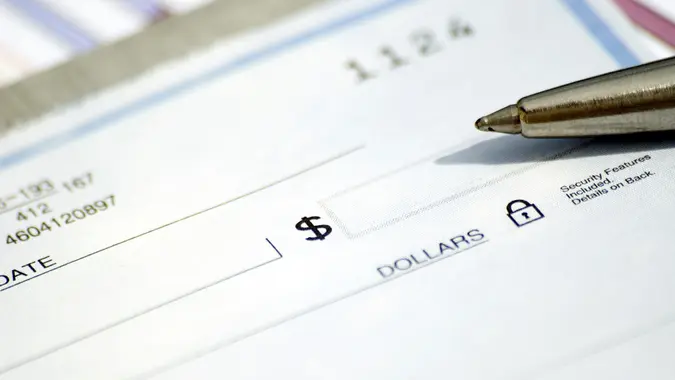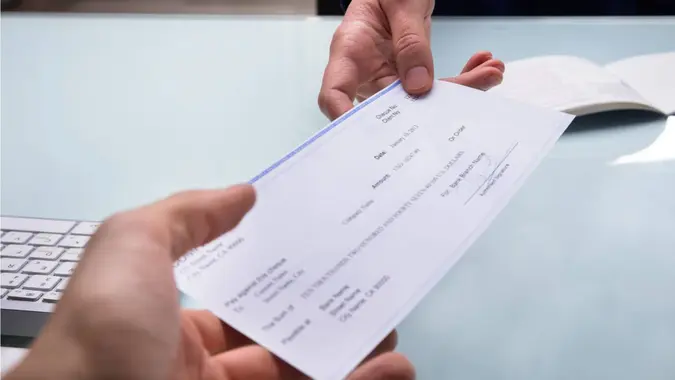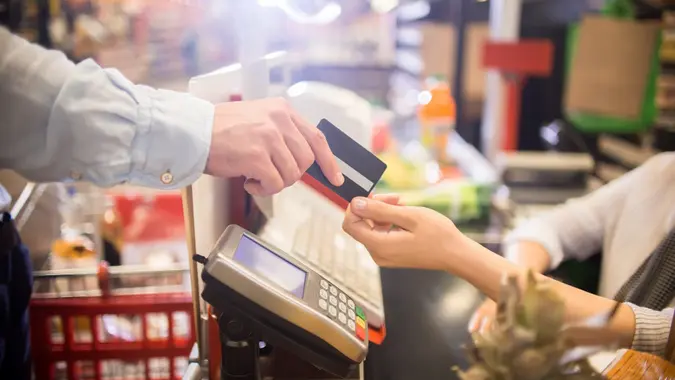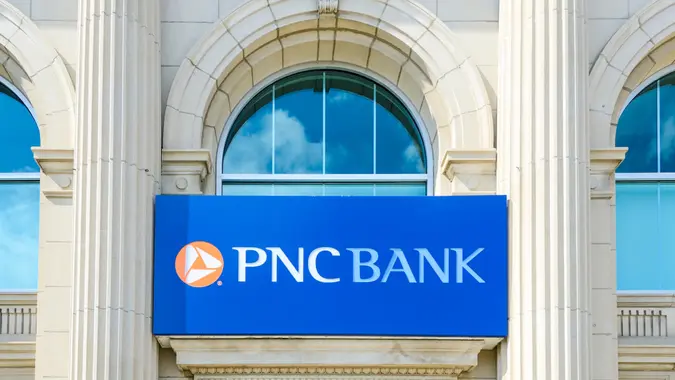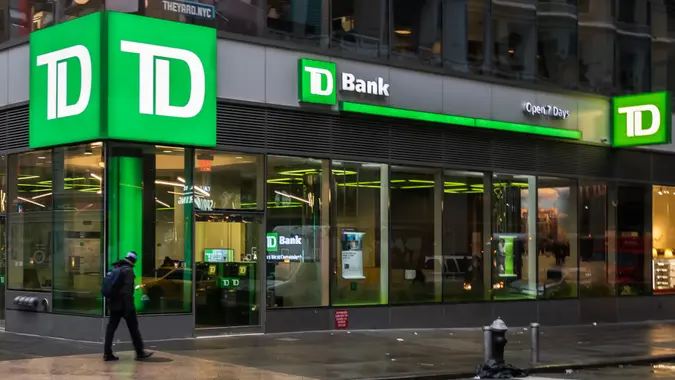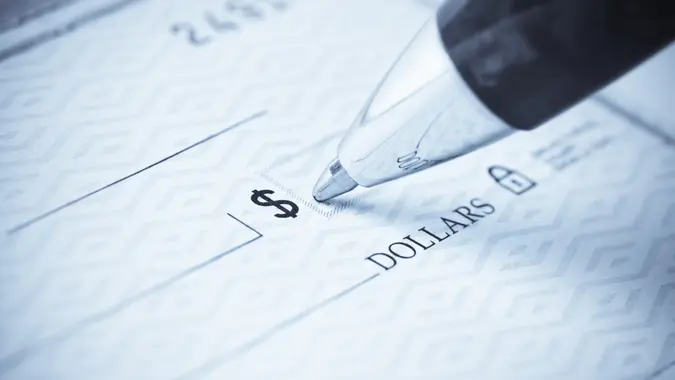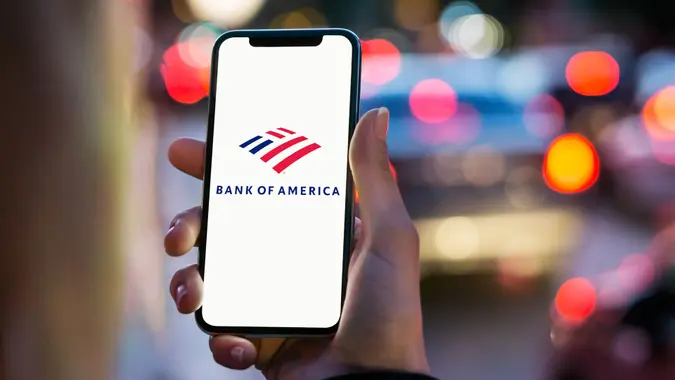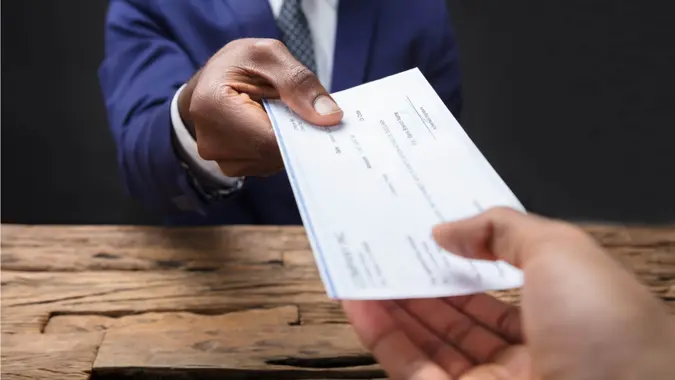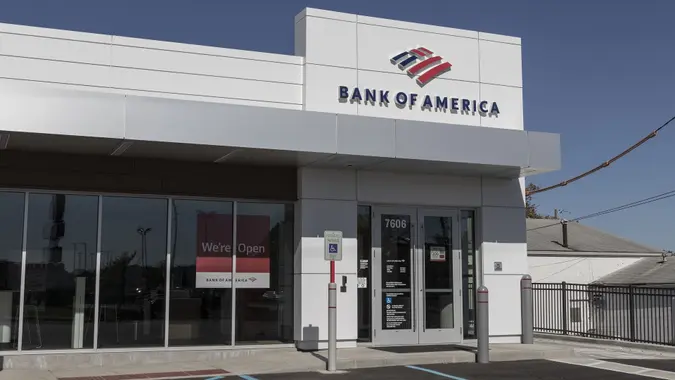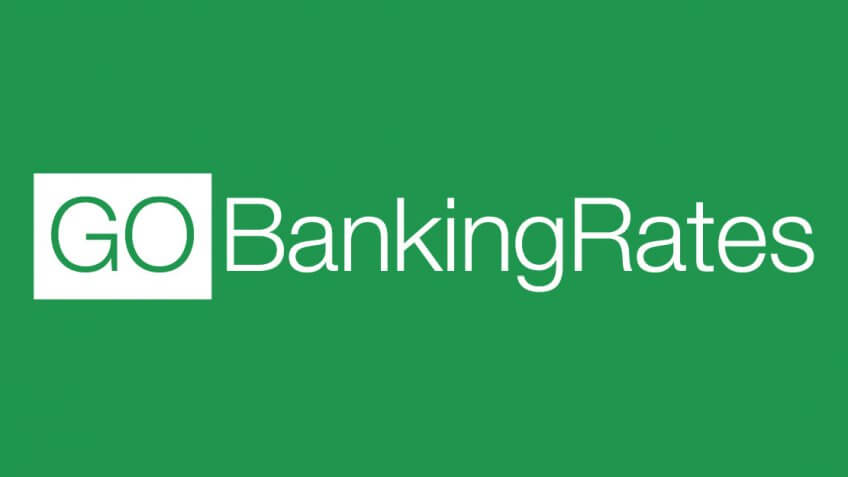What Is a Bank Routing Number and How To Locate Yours

Commitment to Our Readers
GOBankingRates' editorial team is committed to bringing you unbiased reviews and information. We use data-driven methodologies to evaluate financial products and services - our reviews and ratings are not influenced by advertisers. You can read more about our editorial guidelines and our products and services review methodology.

20 Years
Helping You Live Richer

Reviewed
by Experts

Trusted by
Millions of Readers
In today’s world of electronic banking, knowing how to find your bank’s routing number is important. Whether setting up direct deposits or transferring money, this nine-digit code ensures transactions are routed to the correct financial institution.
Here’s a closer look at what a bank routing number is, where to find it and how it’s used.
What Is a Bank Routing Number?
A bank routing number, also known as an ABA routing number, is a nine-digit code assigned to financial institutions in the U.S. by the American Bankers Association. It was introduced in 1910 to streamline banking transactions and evolved with the creation of the Federal Reserve in 1913.
These numbers play an important role in directing payments to the correct bank. They are used for a variety of transactions, including direct deposits, wire transfers and online bill payments.
Where To Find Your Routing Number
Your bank should provide the routing number when you open an account. If you need to find it again, you can do so using a variety of resources.
On a Check
If you have paper checks, your routing number is located on the bottom left corner. It’s the first group of nine digits, followed by your account number and check number.
Online or Mobile Banking
You can locate your routing number on your bank’s online banking site or mobile app.
- Online banking: Log in to the site using your account credentials. Select the account you want to view and look for a section labeled “Account Information” or “Details.”
- Mobile app: Open the bank app and log in. Navigate to your account and look for a section labeled “Account and Routing Numbers” or similar.
Contacting Your Bank
If you’re unsure of your routing number, you can call or visit your bank. Large banks may have multiple routing numbers depending on your account type or location. Bank representatives can provide the correct number for your needs.
Bank-Specific Numbers
The American Bankers Association allows banks to have up to 10 routing numbers, and large financial institutions often have different routing numbers for each state. Some even have more than one for some types of transactions, such as wire transfers. You should always confirm the routing number before initiating a transaction.
How Routing Numbers Are Used
Banks use routing numbers to process several types of transactions. The nine-digit routing number is like an address identifying the bank or financial institution and its location. Here are some of the common uses:
- Direct deposits: Employers and government agencies use routing numbers to set up payroll and Social Security payments.
- Electronic payments and transfers: Peer-to-peer transfers like Zelle and online bill pay require your routing number to move funds between accounts.
- Wire transfers: Domestic wire transfers use routing numbers. International transfers require SWIFT codes in addition to your bank routing number.
- Tax refunds: When filing your taxes, you’ll have to provide your routing number to the IRS for direct deposit of your refund.
Difference Between Routing Numbers and Other Banking Numbers
While bank routing numbers identify banks, other number play a role in banking transactions.
- Account number: This number identifies the specific checking account associated with the issued check or savings account associated with a deposit slip.
- SWIFT code: Used for international transactions, SWIFT codes differ from routing numbers, which are only used for domestic transactions.
- Check number: You can find your check number at the top-right corner of your checks. This number is primarily for your own benefit, to help you balance your checkbook and keep track of your spending.
Tips for Using Routing Numbers Safely
Using your routing number safely can help prevent errors and protect your financial information. Always double-check the number before entering it for a transaction to avoid delays or misdirected funds. Only provide your bank routing number on secure, trusted platforms. Keep your guard up when you get requests for your banking details — it could be a scam.
Final Take
Routing numbers play an essential role in keeping the U.S. banking system running smoothly, ensuring money is sent to and from the right accounts. These numbers are used for everything from bill payments to direct deposits. Now that people are banking electronically, you may find that you need to provide your routing number more often.
When looking up a bank routing number, use a trusted source — such as your bank’s mobile app or website — to ensure you’re using the correct number for your account. Using the wrong routing number can lead to transaction delays or errors.
FAQ
Here are the answers to some of the most frequently asked questions about bank routing numbers.- Can you use the same routing number for all transactions?
- Not always. Some banks have different routing numbers depending on the type of transaction and the state your account was opened in. Always double-check with your bank about which routing number to use.
- What should I do if I entered the wrong routing number?
- If you entered the wrong routing number, contact your bank immediately. They may be able to cancel or correct the transaction. If it's too late, the funds might be returned automatically if the routing number doesn't match any active account.
- Do all banks have multiple routing numbers?
- Not all banks have multiple routing numbers. Larger institutions like Chase or Wells Fargo often have different routing numbers for each state. Smaller banks and credit unions typically only use one routing number.
- What is the routing number in the U.S. banking system?
- A routing number is a nine-digit code that identifies a U.S. federal or state-chartered bank. Routing numbers help banks, merchants and consumers ensure financial transactions are accurately attributed to the proper financial institution.
- Are routing numbers the same for each bank?
- No. Some banks use multiple routing numbers for different types of transactions, such as wire transfers and ACH transactions. It's smart to validate routing numbers before initiating money transfers or online bill payments.
- Which routing number do I use?
- The routing number you should use depends on the type of transaction. For direct deposits or ACH transfers, you can typically use your bank's standard routing number. For wire transfers, you may need a SWIFT code or a different routing number. If you're unsure, you should contact your bank.
- What do routing numbers mean?
- Routing numbers are unique identifiers for the banks involved in financial transactions. They enable the U.S. banking system to clear a financial transaction by matching up the appropriate financial institutions, ensuring money is coming out of and going into the right bank accounts.
Nicole Valentine, Virginia Anderson, Elizabeth Constantineau and Andrea Norris contributed to the reporting for this article.
Our in-house research team and on-site financial experts work together to create content that’s accurate, impartial, and up to date. We fact-check every single statistic, quote and fact using trusted primary resources to make sure the information we provide is correct. You can learn more about GOBankingRates’ processes and standards in our editorial policy.
- American Bankers Association. "ABA Routing Number - aba.com."
- RoutingNumber.com. "Routing Number & Bank Account Validation - routingnumber.com."
- TransferWise. "TransferWise."
- Consumer Financial Protection Bureau. 2016. "What is a demand draft, telephone check, or preauthorized draft? - consumerfinance.gov."
- IRS. "Direct Pay Help | Internal Revenue Service - irs.gov."
- Consumer Financial Protection Bureau. 2020. "Online and mobile banking tips for beginners - consumerfinance.gov."
- AARP. 2019. "How cybercrooks can hack your online bank accounts - aarp.com."
- SWIFT. "SWIFT."
 Written by
Written by  Edited by
Edited by  Fact Checked by
Fact Checked by 



